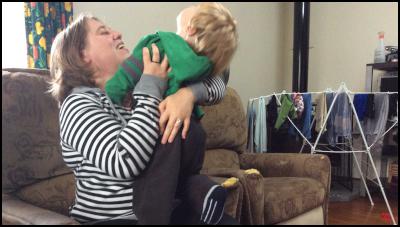
Postnatal Depression: 'The Thief That Steals Motherhood'
by Alison McCulloch
This is the first in a series of articles looking at post-natal depression in Aotearoa New Zealand.
How do you tell someone you’ve thought about dropping your newborn on the floor? That you can’t stop horrific images running through your mind, images of you driving off a cliff, your baby in the backseat? Why is it that you feel nothing for this child you wanted for so long? Wouldn’t an adoptive mother be better for her than you? And how much longer can you go on lying awake all night and crying all day?
Post-natal depression is a sly and cruel illness, described by one expert as ‘the thief that steals motherhood’, it creeps up on its victims, hiding behind the stress and exhaustion of being a new parent, catching many women unawares and unprepared.
Research indicates around 15 percent of mothers will suffer from post-natal depression – up to 9,000 cases a year in New Zealand alone – making it a serious public health issue that affects mothers, children, partners and wider whānau.
But even though this is a well-studied, well-known condition, a majority of cases continue to go undetected and untreated, casting what one GP says is a long shadow over the next generation, and leaving many women with a difficult legacy of guilt, regret and, in some cases, ongoing illness.
‘I Felt Like He Wasn’t Mine’
January’s* illness began during her second pregnancy – anxiety, insomnia, intrusive thoughts. She told herself it was “normal” for a pregnant woman to feel like this and hoped the symptoms would go away when her baby was born. “I had terrible insomnia and I would lie awake at night thinking about all these wildly improbably scenarios and getting really anxious about them. ‘What if we’re out walking and my daughter falls off a cliff’ – which is not going to happen, but all those things were going around in my head and I had all these fears of all these awful things happening.”
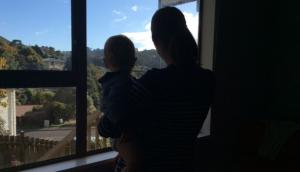 But
instead of going away after the birth of her son, January*
says, the symptoms just got worse.
But
instead of going away after the birth of her son, January*
says, the symptoms just got worse.
“As the weeks went on, I felt like he wasn’t my child. I mean I was doing everything for him, but I just didn’t feel any connection. I spent every day sobbing. I was crying all day every day couldn’t sleep again and obviously wasn’t getting much sleep with a newborn. … I just felt like he wasn’t mine, I thought maybe it would be better if we got him adopted because I didn’t think – you know, I just felt absolutely nothing, just thought, ‘no let’s adopt him, I’m a terrible mother, I'm useless, I’m awful’, and I was still having all these really awful anxious and intrusive thoughts.”
It wasn’t until January’s son was six-weeks' old that she got help. “I went to my GP for his six-week check-up and at the end, she sort of said ‘Oh and how are you?’ and I went, ‘Oh I’m, ooooooh’, and then just burst into tears and it all came out.”
January* is actually one of the lucky ones. Her doctor took her seriously, prescribing antidepressants and referring her for counselling. And eventually, she found her way to a local PND support group who directed her a counsellor who specialised in PND. For January*, the group was a lifesaver. “If I didn’t know about them, I don’t know where I would be actually. I mean the medication and counselling has helped, but just having someone to talk to locally who gets it, who understands.”
But for every woman who gets help, data from District Health Boards and the Ministry of Health indicate there are many more who don’t and for myriad reasons. Some never reach out or don’t realise they are sinking; others do, but their concerns are not heard, or aren’t taken seriously enough by those they tell.
A Dysfunctional System

Dr. William Ferguson
GPs left the maternity care field in the 1990s, so there is no single provider who follows a woman through her pregnancy and into motherhood, something Ferguson sees as one more barrier to early diagnosis. “There was something about knowing these women, certainly before they got pregnant, but certainly knowing them right through the pregnancy, and then seeing them afterwards that you were able to see the changes as they occurred,” he said.
Now, pregnant women register with a Lead Maternity Carer (LMC), almost always a midwife, who sees them through their pregnancy until four to six weeks after the birth, when they’re handed over to a Well Child/Tamariki Ora (WCTO) provider, usually a Plunket nurse. There's funding for a total of 13 visits from birth until the child is 5 years old, first by the midwife and then the WCTO provider.
The timing of the hand-over from midwives couldn’t be worse for catching post-natal depression, which Ferguson says really starts to take hold from about six weeks after a woman has given birth.
'I Don't Think My Midwife Ever Asked About It'
January* described her midwife was “lovely”, but not much help with her mental health concerns. As a second-time mum, January* said there was an attitude of ‘Oh, you’ve done it once and you were fine’. “I don’t think my midwife ever asked about it and I don’t think anyone was particularly concerned about it,” she said.
Like January*, several women interviewed for these articles who were otherwise happy with their midwives reported little help when it came to mental health issues.
April*, mother of a toddler son, said she now realises she went through her pregnancy with undiagnosed ante-natal depression – estimated to affect 10 percent of pregnant women and a risk factor for later post-natal depression. She said that at one point during her pregnancy she asked for help from her midwife “and she pretty much said unless I wanted to throw myself off the building there wasn’t anything they could do for me”.
July*, a first-time mother, said her midwife was “useless”. “Looking back, it was pretty obvious, like every time I saw her in those six weeks, I was bawling. And I was beside myself as to what to do about the feeding.” The first time she heard about PND, she said, “was when Plunket came at about six weeks and they gave me a pamphlet”.
Several of the mums, though, say they did get the help they needed. February*, a mother of two who some years ago was diagnosed with OCD and an anxiety disorder, says when she asked for help, she was referred to maternal mental health teams who gave her good support.
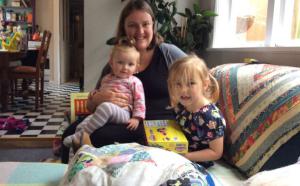
Sarah Shore and her daughters
Similarly, Sarah Shore, mother of two daughters, said the midwives she had for her pregnancies were great, as was the care she received. Like February*, Shore had a history of mental health issues before having children, and was on the specialist team’s radar early on. Her second midwife even helped her wrestle with the question of whether or not to continue with a pregnancy, “which I don’t think is in their job description”.
Dr Sue Cowie, a senior tutor in Clinical Psychology at the University of Auckland wrote her Ph.D. thesis on post-natal depression, interviewing 24 women as part of her research. She, too, said that while most of the women liked their midwives “almost none of them said they would tell them about how they were feeling – and that’s problematic”.
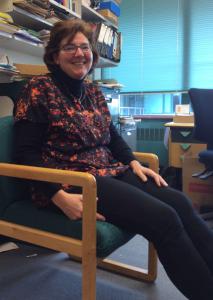
Dr. Sue Cowie
Busy Appointments
There is a lot Well Child Tamariki Ora nurses have to pack in to their appointments, which are focused on the well-being of the infant. Midwives, too, have seen the demands on their time increase. Alison Eddy, a midwifery advisor with the New Zealand College of Midwives, says checks associated with public health initiatives include things like family violence, smoking cessation, breast feeding and immunisation.
In terms of mental health, midwives are advised to follow Ministry of Health guidelines around depression in primary care by asking three broad questions (known as the PHQ-3, for Patient Health Questionnaire-3) about mood and whether the woman wants help. And while

The mental health screening tool known as PHQ-3
most do, a 2010 survey reported that “a significant 25.8 percent do not”. Of perhaps more concern, however, was that once a new mother was identified as having a mental health problem, nearly 40 percent of lead maternity carers said there was either nowhere to refer her or, if there was, they didn’t know about it. In addition, a third of the respondents "felt that maternal mental health services were overwhelmed, poorly coordinated or insufficient". (For more about screening, see article 2 in the series 'But I'm Not Depressed')
That midwives – and women themselves – are unsure where to turn for help is not surprising considering the piecemeal nature of maternal mental health services, which depend on where you live, and whether or not someone has had the time and energy to set up a local PND support group or champion the issue from inside a DHB.
Information from all 20 DHBs (links to Excel document) show that while nearly all have specialist maternal mental health teams for women who are severely ill – or access to a shared service – for those in the mild to moderate middle, there are big disparities. Some DHBs fund community services that specialise in post- or ante-natal depression, while others don’t, referring women to their GPs and community mental health teams. DHBs also vary on whether or not they require screening for new mothers, on what screening tools are used and whose responsibility any screening is.
The Ministry of Health itself has acknowledged the disparities, writing in its 2012 blueprint for perinatal and infant mental health services, “Healthy Beginnings” that: “Mental health services for mothers and infants do not exist in some places and where they do exist development has been somewhat piecemeal. No DHB currently provides the full range of perinatal and infant mental health and AOD services that are required.”
New Unit in Auckland
At the acute end, there have been improvements since “Healthy Beginnings” came out, most notably a new Mother Baby Unit in Auckland. Dr. Tanya Wright is a psychiatrist with the Auckland District Health Board, and helped set up the unit, which is aimed at treating women suffering a major emotional illness who need hospital level care without being separated from their babies.
Part of $18 million in new money for maternal mental health announced in 2013, the 4-bed unit opened its doors just over a year later, in October 2014. Wright says nearly half of the admissions have been for mothers with psychotic illnesses, and about half have been for those with PND. (Before the Auckland unit was set up, there was only one mother and baby unit in the country, in Christchurch.)
She acknowledges the patchy nature of mental health services for new mothers, particularly for non-critical patients. “That's actually the case internationally,” she says. “It’s absolutely wrong that post code determines what kind of mental health services you receive but that’s the case, and realistically that’s the case across the health sector.”
“If you include post-natal distress in your thinking, the statistics suggest that about 1 in 5 women experience quite significant post-natal distress or depression or other illness, so there’s an enormous need for services, and the mental health services that we currently have don’t address that entire spectrum,” Wright says.
According to the Ministry of Health, in 2015 maternal mental health teams saw just over 3,500, women nationally. Those numbers together with reports from people working in the sector confirm the experiences of new mothers who felt, as one put it, that you have to be “a really really really bad case” to be referred to a specialist maternal mental health service.
‘They've Got No Idea’
 May*
was referred by her midwife to an MMH team and says she was
admitted and discharged several times without getting much
support. She said the first time she was discharged, it was
done over the phone, without her ever having had a
face-to-face meeting with anyone from the team.
May*
was referred by her midwife to an MMH team and says she was
admitted and discharged several times without getting much
support. She said the first time she was discharged, it was
done over the phone, without her ever having had a
face-to-face meeting with anyone from the team.“It’s so easy to get out, all you say is the right things, and I’ve even done that a handful of times when Plunket’s referred me because my partner’s been concerned, and all I need to say is ‘Oh no’ and you just worm your way out of it because you don’t want to have the label and the stigma,” she said.
“I mean like they could call you up on the phone and you could be sitting the corner and plastering the wall with your own feces, and you just answer the phone well: ‘Hello [Name] speaking – Oh yeah, no no I’m feeling great oh yeah-nah it’s all good, thank you, thank you bye.’ You know, you carry on, like, etching something into the wall. They’ve got no idea because they haven’t seen you, they haven’t come into your environment.”
She said her impression of her region’s MMH service was that they were “overworked, understaffed, and they just kind of downplay everything so they don’t need to take action”.
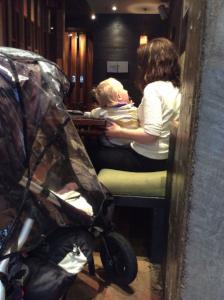 June*, too, struggled to get help. She went
through her pregnancy with severe insomnia – “at one
point I didn’t sleep at all for five days” – and says
she had a mental and physical breakdown that was “like
hell”. June*'s midwife didn't feel
equipped to deal with it, so referred her to the hospital's
midwife team, who June* says were great. But she still
couldn't access mental-health help. "The first time I got
referred to MMH, they said no, because I wasn’t bad
enough,” she said. To get to see the specialist
team “you basically have to be scoring almost full points
on the whatever depression scale they use. … And after I
scored almost full points on that they saw me pretty
quickly.”
June*, too, struggled to get help. She went
through her pregnancy with severe insomnia – “at one
point I didn’t sleep at all for five days” – and says
she had a mental and physical breakdown that was “like
hell”. June*'s midwife didn't feel
equipped to deal with it, so referred her to the hospital's
midwife team, who June* says were great. But she still
couldn't access mental-health help. "The first time I got
referred to MMH, they said no, because I wasn’t bad
enough,” she said. To get to see the specialist
team “you basically have to be scoring almost full points
on the whatever depression scale they use. … And after I
scored almost full points on that they saw me pretty
quickly.”
June*, whose baby recently turned 2, sees the main problem as a lack of early intervention. “If they intervened earlier, it would save a lot of time and money — and potentially save women a lot of distress."
Kei Hea Ngā Ratonga Māori?
Services that focus on Māori women are even harder to come by in some areas, and information from DHBs (links to Excel document) show the rates at which Māori women access maternal mental health services vary. Meanwhile, the Ministry of Health reported in March of this year, while 72 percent of all children up to the age of one year had received all 10 of their core Well Child/Tamariki Ora visits, only 57 percent of Māori and 59 percent of Pacific children had.
Māori midwives are also in short supply, with Radio New Zealand's Te Manu Kohiri reporting in October last year that only 260 — or less than 9 percent — of the country's 3000 midwives were of Māori descent, at the same time as 22 percent of all births in the country are to Māori mothers.
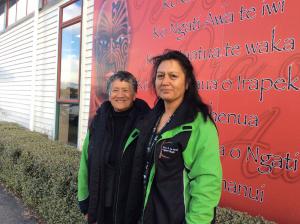
Aneta Tarei, left, and Tui Edwards
“Most of our Māori mums are really good. They just get on with it – they birth quickly because they’ve got other children, they don’t let anything depress them. But I’ve got a couple in there that fit the bill for postnatal depression and it’s lack of support and – relationship breakdown; you’ve got that whole sleep deprivation, your nutrition, and if you’ve had a traumatic and difficult birth or a refluxy baby – it just impacts.”
Not having a health-care provider who understands kaupapa Māori can be an obstacle to Māori women opening up if they’re having problems. “They need that cultural support from their midwives, so a lot of them just shut off and don’t interact with their midwives,” Tarei said. “If they need follow up, they won’t keep their appointments with their maternal mental health nurse, so we step in to be the support service for them.”
Tui Edwards, who also works with NASH, wrote her Master’s Thesis on Māori women and breastfeeding, and says although her research wasn’t focused on PND, about half the eight women she interviewed “identified that at some stage they had gone through some form of depression”.
“Our Māori people, they don’t like to talk out, they’re what we call whakamā, they’re very shy, so they’re not forthcoming in wanting to say or even identifying. Most of them said they identified it later on. So that’s the hard thing, and not all our Māori women will engage with a midwife until they are almost due.”
In her research, Edwards looked at how traditional Māori ways of birthing were stifled in the early 1900s, as birthing moved to hospital settings, and midwives seeking registration were required to undergo Pākehā training that didn’t recognise their skills as tapuhi or traditional Māori birth attendants.
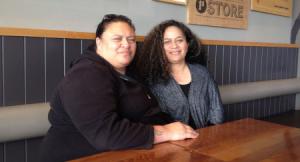
Teiaro (Tei) Tukaokao, left, and Amo
Tutengaehe-Ferris
of Moana Midwives.
Tutengaehe-Ferris says while there’s stigma around postnatal depression, there’s stigma around simply being Māori. “Being Māori in general, people make judgments,” she says. “Being a Māori midwife for instance – here’s a good example — when we’re in a clinical situation many times Tei and I have been mistaken for whānau rather than midwives, which seems to be because of the colour of our skin. Or maybe it's because they're not used to dealing with Māori clinicians." She says this can have a flow-on effect in terms of care of Māori clients, postnatal, around well-being, depression and healing. "It is due to the undermining nature of how Māori are perceived in general."
But, like Tarei in Ngāti Awa territory, Tutengaehe-Ferris says the other side of the coin is that being Māori is a huge help when dealing with Māori mums. “One thing I find working within my own rohe, my own iwi, all those connections help me when I’m working with Māori whānau, so I have an understanding of whakapapa, I have an understanding of Te Reo, and therefore I have an understanding of well-being from a Māori perspective."
She says Sir Mason Durie's health model, Te Whare Tapawhā, is embodied in their practice as it acknowledges the four cornerstones of wellbeing: tinana, hinengaro, wairua, whānau (body, mind, spirit, family).
*Pseudonyms are used where anonymity has been requested.
Other articles in this series:
2. ‘But, I’m Not Depressed‘ (screening, causes, treatments)
3. Finding Someone Who ‘Gets It‘ (services, volunteering on the frontline)
4. Quick links and resources
5. Audio – Women Tell Their Stories
Articles in this series were supported by a grant from the Scoop Foundation for Public Interest Journalism.
This investigative journalism project by Alison McCulloch was funded entirely by member donations to the Scoop Foundation for Public Interest Journalism. If you want to see more quality public interest journalism like this please donate to, or become a member of, the Scoop Foundation here.
The Foundation is currently running a membership drive for October and has some great rewards on offer including a multi-author book on the future of journalism in New Zealand.
Alison McCulloch will be interviewed by Kim
Hill on Kim’s RNZ Saturday morning show at 9.05am on 22nd
October, and that interview will be subsequently available
on the RNZ website.


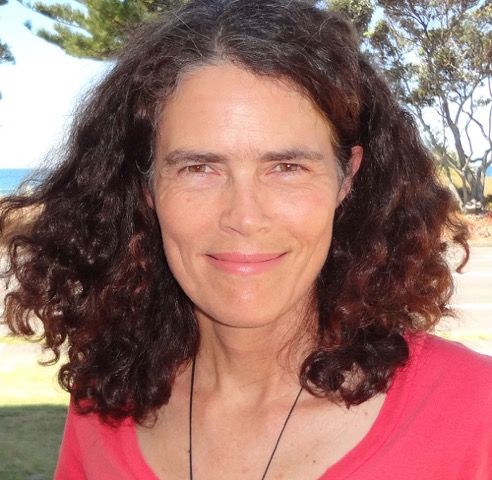
 Gordon Campbell: On Wealth Taxes And Capital Flight
Gordon Campbell: On Wealth Taxes And Capital Flight Ian Powell: Why New Zealand Should Recognise Palestine
Ian Powell: Why New Zealand Should Recognise Palestine Binoy Kampmark: Squabbling Siblings - India, Pakistan And Operation Sindoor
Binoy Kampmark: Squabbling Siblings - India, Pakistan And Operation Sindoor Gordon Campbell: On Budget 2025
Gordon Campbell: On Budget 2025 Keith Rankin: Using Cuba 1962 To Explain Trump's Brinkmanship
Keith Rankin: Using Cuba 1962 To Explain Trump's Brinkmanship Binoy Kampmark: The Killing Of Israeli Embassy Staffers - Netanyahu’s Antisemitism Canard
Binoy Kampmark: The Killing Of Israeli Embassy Staffers - Netanyahu’s Antisemitism Canard